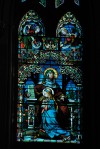“…you know that those who perform the temple service eat the temple offerings and those who wait upon the altar claim their share of the sacrifice…the LORD gave instructions that those who preach the Gospel should earn their living by the Gospel.”
I Corinthians 9:12-14 New English Bible
Ministers in the New Testament are often referred to as elders, deacons, bishops, or ‘fellow-workers’. Pastors developed into modern professionals. The custom of the Protestant and orthodox churches is to employ a priesthood. However, we have no need for priests since we have a High Priest in a heavenly tabernacle. Professional preachers are installed when they demonstrate a ‘call of God’ and complete a seminary course. The office of priest was transferred from Judaism of the Second Temple. Our preachers have become priests when they really are simply leaders of congregations. The ministry of the president of the congregation has replaced the collective ministry of the church. One guy with an ungodly amount of pressure and responsibility instead of an assembly of distributed godly ministry.
“But you must not be called ‘rabbi’ ; for you have one Rabbi, and you are all brothers…”
Matthew 23:8 New English Bible
Early church practice did not employ priests because leadership was plural. Apostles vetted elders; they were not trained in seminary. Deacons are expected to be teachers, hospitable, and active. Deacons like elders are expected to be sacred models which is not the same as being a professional. Payment for teachers is encouraged, but caution is given to those seeking to enrich themselves by the ministry of the gospel. The salary of the pastor/teacher is not to establish a priestly guild. Professional leadership permits the gospel to be influenced by political beliefs and wealthy elders. Professional pastors slowly became a priestly guild like the P’rushim or temple class in Jesus’ time. This professional class was the principal adversary of Jesus. The physical church became the shrine of the priest who presided there. The traditions of men replaced the gospel purity. The teaching elder has become the professional priest along with a princely building and salary. The building and the professional salaries are the main budgetary items. In short the means have become the ends. God’s design with Christ as the Head of the church has been replaced by the tradition of men.
Seminaries attempt to do the work of the Master and the Spirit of Truth. Seminaries should not usurp the Master’s plan. Who vets the seminary professors? The rule is that they must be credentialed by another acceptable church authority —-not by Heavenly authority. No mention of seminaries in the Bible. Churches glorify themselves with complicated theology. A functioning church IS the seminary. So who is the Head of our seminaries? Do seminaries acknowledge the Headship of the Master in their organizational charts? Is the Risen Christ listed first in ‘What We Believe’? No, first are beliefs in regards to Holy scripture and next are trinitarian concepts. The core of the gospel is ‘Jesus was raised from the dead by God’. Why diminish the witness of Heaven? Churches have literature, affiliations, programs, budgets etc. that come down from earthly authorities. God glorified the Son. Why don’t we just say so? Christ should be first in all things since that is God’s witness for all earthly and all heavenly powers for all of time. “Jesus is Lord” is the churches’ theology. “Jesus have mercy” is our deliverance and the institution of all Heavenly resources towards the believer. Why can’t we simply state divine facts? All those that follow the Master have the light of life to guide them in a darkening world. (John 8:12)
The vocation of each believer is mentioned in Eph 4:1-3—- “the prisoner of the Lord beseech you that ye walk worthy of the vocation wherewith ye are called with all lowliness and meekness…” In verse 12 the pastoral and teaching ministry of the church is given as the means to prepare the general membership for the collective ministry. The Ephesians 4:12 purpose of teaching is given as ‘the perfecting of the saints for the work of the ministry’ not so that clergy will perfect their ministry. Is not the ‘nonprofessional call’ just as important as the professional calling? It seems the church teachers have taken up the rabbinic role that our Master performed. However, if a large church effectively prepares the general membership for the collective ministry, many teachers are required. The elders must become teachers and ministers like the pastor. Pastors, today, are administrators more than teachers of teachers. Deacons are rulers instead of models of Christ’s love. Deacons expect to be planners or employers not ‘serving tables’. Hear Philippians 2:15–“Do all things without grumbling or disputing that you may prove yourselves to be blameless and innocent, children of God above reproach in the midst of a crooked and perverse generation, among whom you appear as lights in the world” (NASB). When Jesus is the Head of the church it is a learning and a light-giving church.
The New Testament epistles are addressed to the collective membership rather than to the leaders. However, the Revelation of St. John is addressed “to show unto His servants things which must shortly come to pass” and the specific prophecies to the Asian churches are addressed to the messenger of each respective assembly. The Risen Master has a special message for the teachers and preachers here and its a powerful warning in each case. Yet His warning and blessing and truth is for every hearer this side of heaven.

